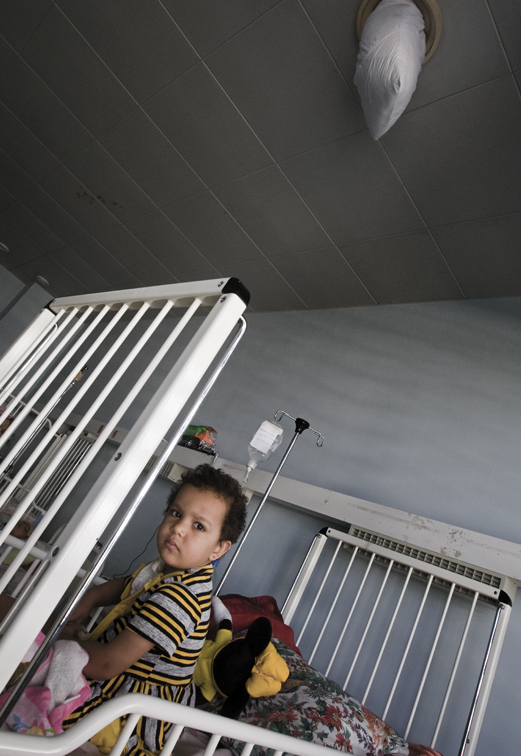By Umar Khan.

Tripoli, 9 July 2013:
Tripoli Medical Centre (TMC), one of the largest hospitals in North Africa, is failing children suffering from cancer, with drastic shortages of essential medication.
According to both parents and medical staff, slow procurement procedures mean that essential daily dosages are often missed. The paediatric oncology ward, which deals with childhood cancers, often lacks medicines, with doctors relying on supplies arranged by non-governmental organisations (NGOs) and social workers.
The paediatric oncology ward itself is in need of urgent attention and presents a grim picture. Outdated equipment, rusty beds and broken furniture are common sights, with the department’s overall appearance further tainted by paint peeling off the walls.
Decor and furnishings are the last thing that parents will complain about, however, as their main concern is making sure their children are receiving the proper treatment.
One parent, identified only as Um Maryam, complained about the hospital’s lack of support. She travels all the way from Ghariyan to visit her daughter. “I borrow money for each visit to Tripoli and sometimes we are told to buy medicines from outside,” she said, adding that she could not afford to buy these. Sometimes, she said, hospital staff tried to help by sourcing medication from elsewhere.
There are not many NGOs currently working in the medical sector in Libya, and help from civil societies is also very limited. TMC management, however, should not need any help from civil societies to procure medicines, because of its allotted budget from the Ministry of Health.
Sluggish procurement systems and a lack of coordination between the hospital management and health ministry officials seem to be the root of the problem. An official from the Ministry of Health, Mohummed Khubali, confirmed that there was a problem with supplies of medicines. “These shortages result from a lack of coordination and we try to minimize it as much as possible,” he said. Khubali, however, refused to give any further details.
Another Ministry official, Nooreddin Muhummed, said that the hospitals themselves are responsible for such shortages. “It depends on the supply report from hospitals,” he said, “some are very professional and active and don’t face any problems, while others are slow. Patients suffer because of them.”
TMC management has declined to comment on the issue, only saying: “everything is in order. The hospital is operating normally.” Doctors working at TMC who have complained about the shortages asked to remain anonymous, fearing a backlash from health sector officials.
One young activist, Omaima Rojbani, has taken up the cause and is working independently to try and help cancer-stricken kids. She started visiting TMC’s children’s oncology ward in 2010 with some friends, taking presents of gifts and balloons.
“We took some gifts for the children for the first time in 2010 and then we started visiting them regularly,” she said. “We were shocked to see the terrible conditions, and we painted the ward in different colors, so they would feel happier.”
“One day a doctor told us that there is such a shortage of medicines, that sometimes it is too late to give these to the patients,” Rojbani told the Libya Herald. “He said that children could do without gifts but not medicines, and told us it would be better if we brought medicines instead.”
She said the doctors gave her the names of the medication needed and, for over a year, her and her friends have been raising money to buy medicines for the children.
She raises money through an extended circle of friends and family. “I just tell them how the parents of those children are feeling and that we should do whatever we can to help them. You don’t need a big system or organisations to do something good, anyone can do it if they really want to.”
Despite several attempts to reach the head of department for all hospitals in Libya, Muhammed al Obeidi, he has not been available to comment.
[/restrict]









